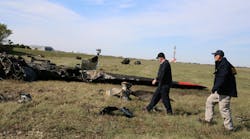Washington, DC, Sept. 20, 2016 – The National Business Aviation Association (NBAA) today issued a report, regarding a fatal 2014 Gulfstream G-IV accident at Hanscom Field Airport in Bedford, MA, which calls for a renewed emphasis on the importance of compliance with the pre-takeoff flight-control checks required by aircraft manufacturers.
Following the Bedford accident, the National Transportation Safety Board (NTSB) determined that the crew did not perform a flight-control check prior to takeoff, and was therefore unaware that the aircraft’s gust lock was engaged, preventing a successful takeoff. The aircraft was destroyed in the resulting accident, and seven people lost their lives.
The Bedford event prompted the NTSB to recommend that NBAA lead an industry-wide, collaborative study to measure the extent of non-compliance with before-takeoff flight checks. That effort resulted in the report NBAA issued today, titled “Business Aviation Compliance with Manufacturer-Required Flight Control Checks Before Takeoff.”
The study, which analyzes 143,756 business aviation flights made between Jan. 1, 2013 and Dec. 31, 2015, found that an average of 15 percent of those flights began with a partial flight control check, and 2 percent began without a full, valid check. The report defined a valid flight check as the stop-to-stop deflection of all flight controls specified by a manufacturer’s aircraft flight manual.
Referring to the oversight by the flight crew in the 2014 Bedford accident, and citing the data compiled by the NBAA report team on broader compliance with before-takeoff flight checks, association President and CEO Ed Bolen stated, in an Executive Summary accompanying NBAA’s report: “As perplexing as it is that a highly experienced crew could attempt a takeoff with the gust lock engaged, the data also reveals similar challenges across a variety of aircraft and operators. This report should further raise awareness within the business aviation community that complacency and lack of procedural discipline have no place in our profession.”
Among the report’s recommendations, NBAA urged operators to establish flight-data monitoring programs (one-percent of operators currently have such programs in place), and to participate in a formal data-sharing program similar to an existing, successful government-industry program known as the Aviation Safety Information Analysis and Sharing System (ASIAS), which focuses on the root causes of accidents, in order to most effectively prevent their recurrence. The study also urged manufacturers to provide clearer requirements for pre-departure flight-control checks.





